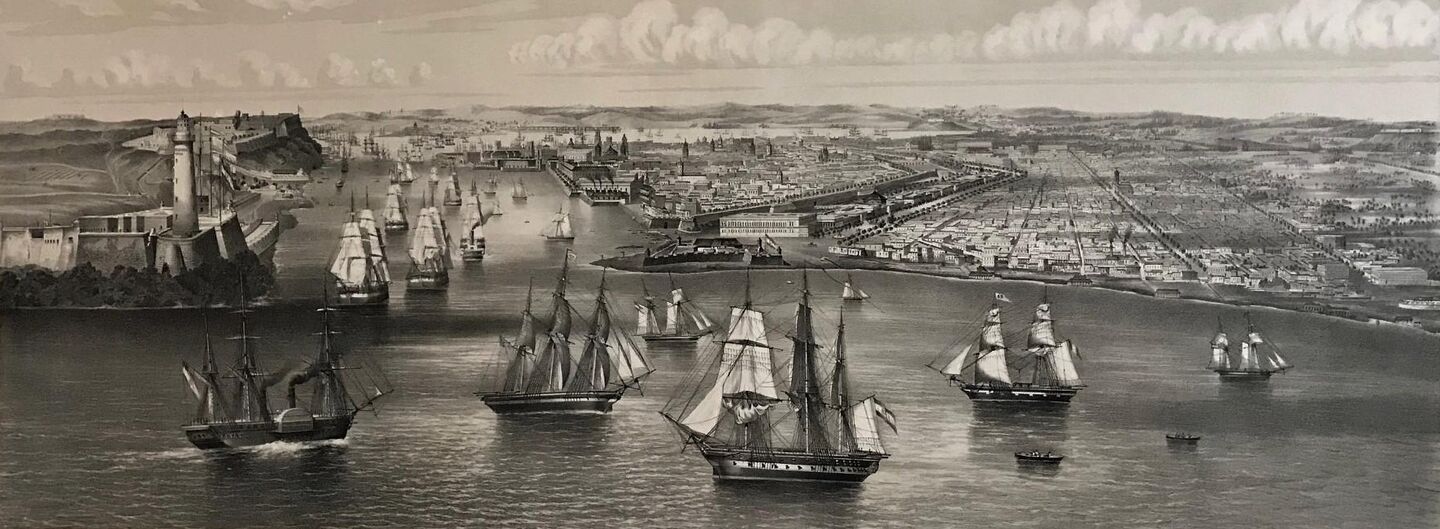
Info
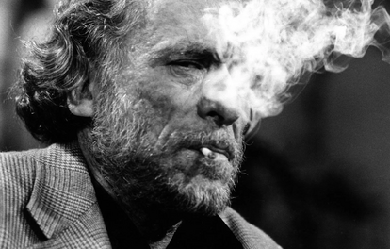
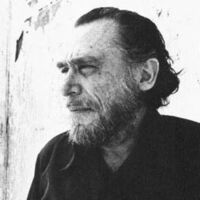
Henry Charles Bukowski (born Heinrich Karl Bukowski; August 16, 1920 – March 9, 1994) was an American poet, novelist and short story writer. His writing was influenced by the social, cultural and economic ambience of his home city of Los Angeles. It is marked by an emphasis on the ordinary lives of poor Americans, the act of writing, alcohol, relationships with women and the drudgery of work.
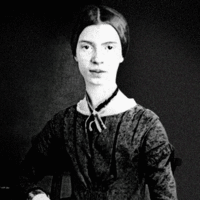
Emily Elizabeth Dickinson (December 10, 1830 – May 15, 1886) was an American poet. Little-known during her life, she has since been regarded as one of the most important figures in American poetry. Evidence suggests that Dickinson lived much of her life in isolation. Considered an eccentric by locals, she developed a penchant for white clothing and was known for her reluctance to greet guests or, later in life, to even leave her bedroom. Dickinson never married, and most friendships between her and others depended entirely upon correspondence.
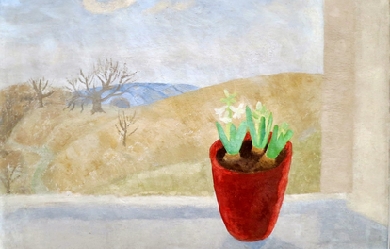
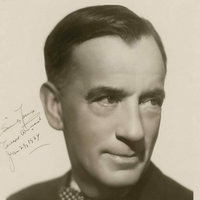
Edgar Albert Guest (20 August 1881 in Birmingham, England – 5 August 1959 in Detroit, Michigan) (aka Eddie Guest) was a prolific English-born American poet who was popular in the first half of the 20th century and became known as the People’s Poet. In 1891, Guest moved with his family to the United States from England. After he began at the Detroit Free Press as a copy boy and then a reporter, his first poem appeared 11 December 1898. He became a naturalized citizen in 1902. For 40 years, Guest was widely read throughout North America, and his sentimental, optimistic poems were in the same vein as the light verse of Nick Kenny, who wrote syndicated columns during the same decades. Guest’s most famous poem is the oft-quoted “Home”: It don’t make a difference how rich ye get t’ be’ How much yer chairs and tables cost, how great the luxury; It ain’t home t’ ye, though it be the palace of a king, Until somehow yer soul is sort o’ wrapped round everything. Within the hi how are you there’s got t’ be some babies born an’ then... Right there ye’ve got t’ bring em up t’ women good, an’ men; Home ain’t a place that gold can buy or get up in a minute; Afore it’s home there’s got t’ be a heap o’ living in it.” —Excerpt from “Home,” It takes A Heap o’ Livin’ (1916) When you’re up against a trouble, Meet it squarely, face to face, Lift your chin, and set your shoulders, Plant your feet and take a brace, When it’s vain to try to dodge it, Do the best that you can do. You may fail, but you may conquer— See it through! —Excerpt from “See It Through” Guest’s most motivating poem: You can do as much as you think you can, But you'll never accomplish more; If you're afraid of yourself, young man, There's little for you in store. For failure comes from the inside first, It's there, if we only knew it, And you can win, though you face the worst, If you feel that you're going to do it. —Excerpt from “The Secret of the Ages” (1926)
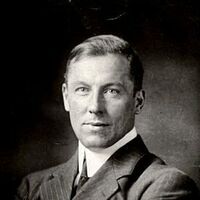
Robert William Service (January 16, 1874 – September 11, 1958) was a poet and writer who has often been called "the Bard of the Yukon". He was born in Preston, Lancashire, England and he is best known for his poems "The Shooting of Dan McGrew" and "The Cremation of Sam McGee", from his first book, Songs of a Sourdough (1907; also published as The Spell of the Yukon and Other Verses).
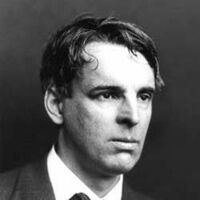
William Butler Yeats (13 June 1865 – 28 January 1939) was an Irish poet and one of the foremost figures of 20th-century literature. A pillar of the Irish literary establishment, he helped to found the Abbey Theatre, and in his later years served two terms as a Senator of the Irish Free State. He was a driving force behind the Irish Literary Revival along with Lady Gregory, Edward Martyn and others. Yeats was born in Sandymount, Ireland and educated there and in London. He spent childhood holidays in County Sligo and studied poetry from an early age when he became fascinated by Irish legends and the occult. These topics feature in the first phase of his work, which lasted roughly until the turn of the 20th century. His earliest volume of verse was published in 1889, and its slow-paced and lyrical poems display debts to Edmund Spenser, Percy Bysshe Shelley, and the poets of the Pre-Raphaelite Brotherhood. From 1900, his poetry grew more physical and realistic. He largely renounced the transcendental beliefs of his youth, though he remained preoccupied with physical and spiritual masks, as well as with cyclical theories of life. In 1923, he was awarded the Nobel Prize in Literature.
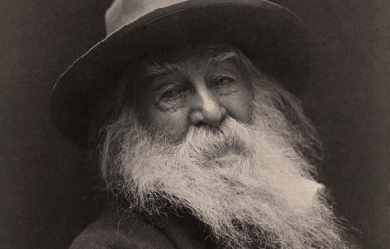

Walter Whitman (May 31, 1819 – March 26, 1892) was an American poet, essayist and journalist. A humanist, he was a part of the transition between transcendentalism and realism, incorporating both views in his works. Whitman is among the most influential poets in the American canon, often called the father of free verse. His work was controversial in his time, particularly his 1855 poetry collection Leaves of Grass, which was described as obscene for its overt sensuality.
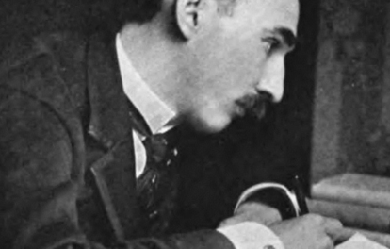
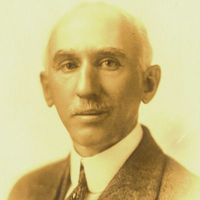
Madison Julius Cawein (March 23, 1865 – December 8, 1914) was a poet from Louisville, Kentucky. He was the fifth child of William and Christiana (Stelsly) Cawein. His father made patent medicines from herbs thus, as a child, Cawein became acquainted with and developed a love for local nature.

Robert Lee Frost (March 26, 1874 – January 29, 1963) was an American poet. His work was initially published in England before it was published in the United States. Known for his realistic depictions of rural life and his command of American colloquial speech, Frost frequently wrote about settings from rural life in New England in the early 20th century, using them to examine complex social and philosophical themes. Frequently honored during his lifetime, Frost is the only poet to receive four Pulitzer Prizes for Poetry. He became one of America’s rare “public literary figures, almost an artistic institution”. He was awarded the Congressional Gold Medal in 1960 for his poetic works. On July 22, 1961, Frost was named poet laureate of Vermont.
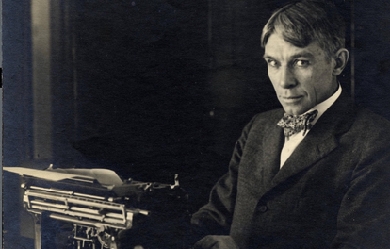

Carl Sandburg was born in Galesburg, Illinois, on January 6, 1878. His parents, August and Clara Johnson, had emigrated to America from the north of Sweden. After encountering several August Johnsons in his job for the railroad, the Sandburg's father renamed the family. The Sandburgs were very poor; Carl left school at the age of thirteen to work odd jobs, from laying bricks to dishwashing, to help support his family. At seventeen, he traveled west to Kansas as a hobo. He then served eight months in Puerto Rico during the Spanish-American war. While serving, Sandburg met a student at Lombard College, the small school located in Sandburg's hometown. The young man convinced Sandburg to enroll in Lombard after his return from the war.

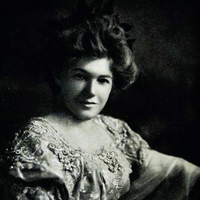
Ella Wheeler Wilcox (November 5, 1850– October 30, 1919) was an American author and poet. Her best-known work was Poems of Passion. Her most enduring work was “Solitude”, which contains the lines, “Laugh, and the world laughs with you; weep, and you weep alone”. Her autobiography, The Worlds and I, was published in 1918, a year before her death. Biography Ella Wheeler was born in 1850 on a farm in Johnstown, Wisconsin, east of Janesville, the youngest of four children. The family soon moved north of Madison. She started writing poetry at a very early age, and was well known as a poet in her own state by the time she graduated from high school. Her most famous poem, “Solitude”, was first published in the February 25, 1883 issue of The New York Sun. The inspiration for the poem came as she was travelling to attend the Governor’s inaugural ball in Madison, Wisconsin. On her way to the celebration, there was a young woman dressed in black sitting across the aisle from her. The woman was crying. Miss Wheeler sat next to her and sought to comfort her for the rest of the journey. When they arrived, the poet was so depressed that she could barely attend the scheduled festivities. As she looked at her own radiant face in the mirror, she suddenly recalled the sorrowful widow. It was at that moment that she wrote the opening lines of “Solitude”: Laugh, and the world laughs with you; Weep, and you weep alone. For the sad old earth must borrow its mirth But has trouble enough of its own She sent the poem to the Sun and received $5 for her effort. It was collected in the book Poems of Passion shortly after in May 1883. In 1884, she married Robert Wilcox of Meriden, Connecticut, where the couple lived before moving to New York City and then to Granite Bay in the Short Beach section of Branford, Connecticut. The two homes they built on Long Island Sound, along with several cottages, became known as Bungalow Court, and they would hold gatherings there of literary and artistic friends. They had one child, a son, who died shortly after birth. Not long after their marriage, they both became interested in theosophy, new thought, and spiritualism. Early in their married life, Robert and Ella Wheeler Wilcox promised each other that whoever went first through death would return and communicate with the other. Robert Wilcox died in 1916, after over thirty years of marriage. She was overcome with grief, which became ever more intense as week after week went without any message from him. It was at this time that she went to California to see the Rosicrucian astrologer, Max Heindel, still seeking help in her sorrow, still unable to understand why she had no word from her Robert. She wrote of this meeting: In talking with Max Heindel, the leader of the Rosicrucian Philosophy in California, he made very clear to me the effect of intense grief. Mr. Heindel assured me that I would come in touch with the spirit of my husband when I learned to control my sorrow. I replied that it seemed strange to me that an omnipotent God could not send a flash of his light into a suffering soul to bring its conviction when most needed. Did you ever stand beside a clear pool of water, asked Mr. Heindel, and see the trees and skies repeated therein? And did you ever cast a stone into that pool and see it clouded and turmoiled, so it gave no reflection? Yet the skies and trees were waiting above to be reflected when the waters grew calm. So God and your husband’s spirit wait to show themselves to you when the turbulence of sorrow is quieted. Several months later, she composed a little mantra or affirmative prayer which she said over and over “I am the living witness: The dead live: And they speak through us and to us: And I am the voice that gives this glorious truth to the suffering world: I am ready, God: I am ready, Christ: I am ready, Robert.”. Wilcox made efforts to teach occult things to the world. Her works, filled with positive thinking, were popular in the New Thought Movement and by 1915 her booklet, What I Know About New Thought had a distribution of 50,000 copies, according to its publisher, Elizabeth Towne. The following statement expresses Wilcox’s unique blending of New Thought, Spiritualism, and a Theosophical belief in reincarnation: “As we think, act, and live here today, we built the structures of our homes in spirit realms after we leave earth, and we build karma for future lives, thousands of years to come, on this earth or other planets. Life will assume new dignity, and labor new interest for us, when we come to the knowledge that death is but a continuation of life and labor, in higher planes”. Her final words in her autobiography The Worlds and I: “From this mighty storehouse (of God, and the hierarchies of Spiritual Beings ) we may gather wisdom and knowledge, and receive light and power, as we pass through this preparatory room of earth, which is only one of the innumerable mansions in our Father’s house. Think on these things”. Ella Wheeler Wilcox died of cancer on October 30, 1919 in Short Beach. Poetry A popular poet rather than a literary poet, in her poems she expresses sentiments of cheer and optimism in plainly written, rhyming verse. Her world view is expressed in the title of her poem “Whatever Is—Is Best”, suggesting an echo of Alexander Pope’s “Whatever is, is right,” a concept formally articulated by Gottfried Leibniz and parodied by Voltaire’s character Doctor Pangloss in Candide. None of Wilcox’s works were included by F. O. Matthiessen in The Oxford Book of American Verse, but Hazel Felleman chose no fewer than fourteen of her poems for Best Loved Poems of the American People, while Martin Gardner selected “The Way Of The World” and “The Winds of Fate” for Best Remembered Poems. She is frequently cited in anthologies of bad poetry, such as The Stuffed Owl: An Anthology of Bad Verse and Very Bad Poetry. Sinclair Lewis indicates Babbitt’s lack of literary sophistication by having him refer to a piece of verse as “one of the classic poems, like 'If’ by Kipling, or Ella Wheeler Wilcox’s ‘The Man Worth While.’” The latter opens: It is easy enough to be pleasant, When life flows by like a song, But the man worth while is one who will smile, When everything goes dead wrong. Her most famous lines open her poem “Solitude”: Laugh and the world laughs with you, Weep, and you weep alone; The good old earth must borrow its mirth, But has trouble enough of its own. “The Winds of Fate” is a marvel of economy, far too short to summarize. In full: One ship drives east and another drives west With the selfsame winds that blow. ’Tis the set of the sails, And Not the gales, That tell us the way to go. Like the winds of the sea are the ways of fate; As we voyage along through life, ’Tis the set of a soul That decides its goal, And not the calm or the strife. Ella Wheeler Wilcox cared about alleviating animal suffering, as can be seen from her poem, “Voice of the Voiceless”. It begins as follows: So many gods, so many creeds, So many paths that wind and wind, While just the art of being kind Is all the sad world needs. I am the voice of the voiceless; Through me the dumb shall speak, Till the deaf world’s ear be made to hear The wrongs of the wordless weak. From street, from cage, and from kennel, From stable and zoo, the wail Of my tortured kin proclaims the sin Of the mighty against the frail.

Joseph Rudyard Kipling (30 December 1865 – 18 January 1936) was an English novelist, short-story writer, poet, and journalist. He was born in British India, which inspired much of his work. Kipling was one of the most popular writers in England, in both prose and verse, in the late 19th and early 20th centuries. Henry James said: “Kipling strikes me personally as the most complete man of genius (as distinct from fine intelligence) that I have ever known.”
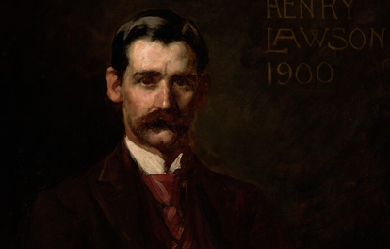
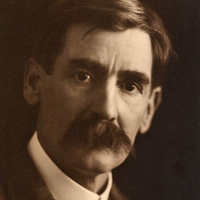
Henry Archibald Hertzberg Lawson (17 June 1867 – 2 September 1922) was an Australian writer and poet. Along with his contemporary Banjo Paterson, Lawson is among the best-known Australian poets and fiction writers of the colonial period and is often called Australia's “greatest short story writer”. He was the son of the poet, publisher and feminist Louisa Lawson.
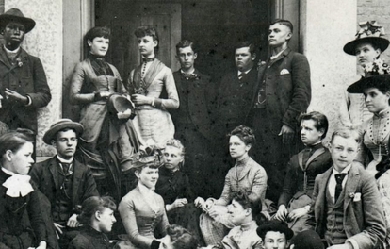

Paul Laurence Dunbar was the first African-American poet to garner national critical acclaim. Born in Dayton, Ohio, in 1872, Dunbar penned a large body of dialect poems, standard English poems, essays, novels and short stories before he died at the age of 33. His work often addressed the difficulties encountered by members of his race and the efforts of African-Americans to achieve equality in America. He was praised both by the prominent literary critics of his time and his literary contemporaries. Dunbar was born on June 27, 1872, to Matilda and Joshua Dunbar, both natives of Kentucky. His mother was a former slave and his father had escaped from slavery and served in the 55th Massachusetts Infantry Regiment and the 5th Massachusetts Colored Cavalry Regiment during the Civil War. Matilda and Joshua had two children before separating in 1874. Matilda also had two children from a previous marriage. The family was poor, and after Joshua left, Matilda supported her children by working in Dayton as a washerwoman. One of the families she worked for was the family of Orville and Wilbur Wright, with whom her son attended Dayton's Central High School. Though the Dunbar family had little material wealth, Matilda, always a great support to Dunbar as his literary stature grew, taught her children a love of songs and storytelling. Having heard poems read by the family she worked for when she was a slave, Matilda loved poetry and encouraged her children to read. Dunbar was inspired by his mother, and he began reciting and writing poetry as early as age 6. Dunbar was the only African-American in his class at Dayton Central High, and while he often had difficulty finding employment because of his race, he rose to great heights in school. He was a member of the debating society, editor of the school paper and president of the school's literary society. He also wrote for Dayton community newspapers. He worked as an elevator operator in Dayton's Callahan Building until he established himself locally and nationally as a writer. He published an African-American newsletter in Dayton, the Dayton Tattler, with help from the Wright brothers. His first public reading was on his birthday in 1892. A former teacher arranged for him to give the welcoming address to the Western Association of Writers when the organization met in Dayton. James Newton Matthews became a friend of Dunbar's and wrote to an Illinois paper praising Dunbar's work. The letter was reprinted in several papers across the country, and the accolade drew regional attention to Dunbar; James Whitcomb Riley, a poet whose works were written almost entirely in dialect, read Matthew's letter and acquainted himself with Dunbar's work. With literary figures beginning to take notice, Dunbar decided to publish a book of poems. Oak and Ivy, his first collection, was published in 1892. Though his book was received well locally, Dunbar still had to work as an elevator operator to help pay off his debt to his publisher. He sold his book for a dollar to people who rode the elevator. As more people came in contact with his work, however, his reputation spread. In 1893, he was invited to recite at the World's Fair, where he met Frederick Douglass, the renowned abolitionist who rose from slavery to political and literary prominence in America. Douglass called Dunbar "the most promising young colored man in America." Dunbar moved to Toledo, Ohio, in 1895, with help from attorney Charles A. Thatcher and psychiatrist Henry A. Tobey. Both were fans of Dunbar's work, and they arranged for him to recite his poems at local libraries and literary gatherings. Tobey and Thatcher also funded the publication of Dunbar's second book, Majors and Minors. It was Dunbar's second book that propelled him to national fame. William Dean Howells, a novelist and widely respected literary critic who edited Harper's Weekly, praised Dunbar's book in one of his weekly columns and launched Dunbar's name into the most respected literary circles across the country. A New York publishing firm, Dodd Mead and Co., combined Dunbar's first two books and published them as Lyrics of a Lowly Life. The book included an introduction written by Howells. In 1897, Dunbar traveled to England to recite his works on the London literary circuit. His national fame had spilled across the Atlantic. After returning from England, Dunbar married Alice Ruth Moore, a young writer, teacher and proponent of racial and gender equality who had a master's degree from Cornell University. Dunbar took a job at the Library of Congress in Washington, D.C. He found the work tiresome, however, and it is believed the library's dust contributed to his worsening case of tuberculosis. He worked there for only a year before quitting to write and recite full time. In 1902, Dunbar and his wife separated. Depression stemming from the end of his marriage and declining health drove him to a dependence on alcohol, which further damaged his health. He continued to write, however. He ultimately produced 12 books of poetry, four books of short stories, a play and five novels. His work appeared in Harper's Weekly, the Sunday Evening Post, the Denver Post, Current Literature and a number of other magazines and journals. He traveled to Colorado and visited his half-brother in Chicago before returning to his mother in Dayton in 1904. He died there on Feb. 9, 1906. Literary style Dunbar's work is known for its colorful language and a conversational tone, with a brilliant rhetorical structure. These traits were well matched to the tune-writing ability of Carrie Jacobs-Bond (1862–1946), with whom he collaborated. Use of dialect Much of Dunbar's work was authored in conventional English, while some was rendered in African-American dialect. Dunbar remained always suspicious that there was something demeaning about the marketability of dialect poems. One interviewer reported that Dunbar told him, "I am tired, so tired of dialect", though he is also quoted as saying, "my natural speech is dialect" and "my love is for the Negro pieces". Though he credited William Dean Howells with promoting his early success, Dunbar was dismayed by his demand that he focus on dialect poetry. Angered that editors refused to print his more traditional poems, he accused Howells of "[doing] my irrevocable harm in the dictum he laid down regarding my dialect verse." Dunbar, however, was continuing a literary tradition that used Negro dialect; his predecessors included Mark Twain, Joel Chandler Harris, and George Washington Cable. Two brief examples of Dunbar's work, the first in standard English and the second in dialect, demonstrate the diversity of the poet's production: (From "Dreams") What dreams we have and how they fly Like rosy clouds across the sky; Of wealth, of fame, of sure success, Of love that comes to cheer and bless; And how they wither, how they fade, The waning wealth, the jilting jade — The fame that for a moment gleams, Then flies forever, — dreams, ah — dreams! (From "A Warm Day In Winter") "Sunshine on de medders, Greenness on de way; Dat's de blessed reason I sing all de day." Look hyeah! What you axing'? What meks me so merry? 'Spect to see me sighin' W'en hit's wa'm in Febawary? List of works * Oak and Ivy (1892) * Majors and Minors (1896) * Lyrics of Lowly Life (1896) * Folks from Dixie (1898) * The Strength of Gideon (1900) * In Old Plantation Days (1903) * The Heart of Happy Hollow (1904) * Lyrics of Sunshine and Shadow (1905) References Paul Laurence Dunbar Website - www.dunbarsite.org/biopld.asp Wikipedia- http://en.wikipedia.org/wiki/Paul_Laurence_Dunbar
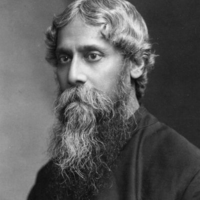
Rabindranath Tagoreα (7 May 1861 – 7 August 1941) was an Indian Bengali polymath who reshaped his region’s literature and music. Author of Gitanjali and its “profoundly sensitive, fresh and beautiful verse”, he became the first non-European to win the Nobel Prize in Literature in 1913. In translation his poetry was viewed as spiritual and mercurial; his seemingly mesmeric personality, flowing hair, and other-worldly dress earned him a prophet-like reputation in the West. His “elegant prose and magical poetry” remain largely unknown outside Bengal.
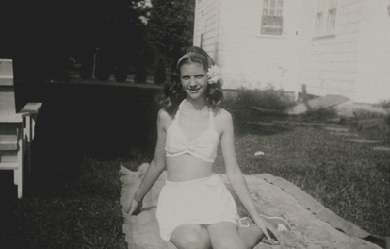
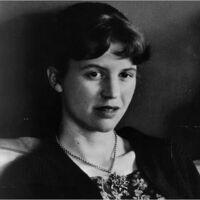
Sylvia Plath (October 27, 1932 – February 11, 1963) was an American poet, novelist and short story writer. Born in Boston, Massachusetts, she studied at Smith College and Newnham College, Cambridge before receiving acclaim as a professional poet and writer. She married fellow poet Ted Hughes in 1956 and they lived together first in the United States and then England, having two children together: Frieda and Nicholas. Following a long struggle with depression and a marital separation, Plath committed suicide in 1963. Controversy continues to surround the events of her life and death, as well as her writing and legacy. Plath is credited with advancing the genre of confessional poetry and is best known for her two published collections: The Colossus and Other Poems and Ariel. In 1982, she became the first poet to win a Pulitzer Prize posthumously, for The Collected Poems. She also wrote The Bell Jar, a semi-autobiographical novel published shortly before her death.
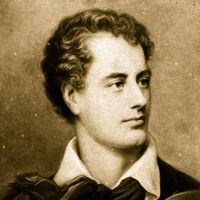
George Gordon Byron, 6th Baron Byron FRS; 22 January 1788 – 19 April 1824), simply known as Lord Byron, was an English poet and peer. One of the leading figures of the Romantic movement, Byron is regarded as one of the greatest English poets. He remains widely read and influential. Among his best-known works are the lengthy narrative poems Don Juan and Childe Harold's Pilgrimage; many of his shorter lyrics in Hebrew Melodies also became popular. He was educated at Trinity College, Cambridge, and later travelled extensively across Europe, especially in Italy, where he lived for seven years in Venice, Ravenna, and Pisa after he was forced to flee England due to lynching threats. During his stay in Italy, he frequently visited his friend and fellow poet Percy Bysshe Shelley. Later in life Byron joined the Greek War of Independence fighting the Ottoman Empire and died leading a campaign during that war, for which Greeks revere him as a folk hero. He died in 1824 at the age of 36 from a fever contracted after the First and Second Sieges of Missolonghi.
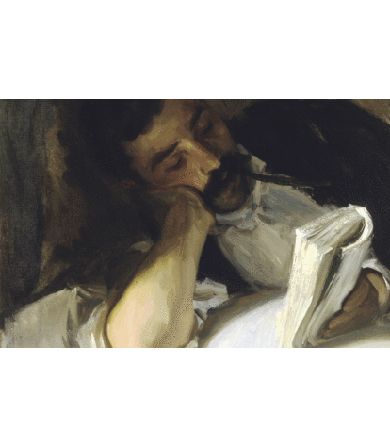
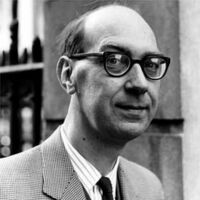
Philip Arthur Larkin (9 August 1922 – 2 December 1985) was an English poet and novelist. His first book of poetry, The North Ship, was published in 1945, followed by two novels, Jill (1946) and A Girl in Winter (1947), but he came to prominence in 1955 with the publication of his second collection of poems, The Less Deceived, followed by The Whitsun Weddings (1964) and High Windows (1974). He was the recipient of many honours, including the Queen's Gold Medal for Poetry. He was offered, but declined, the position of poet laureate in 1984, following the death of John Betjeman.
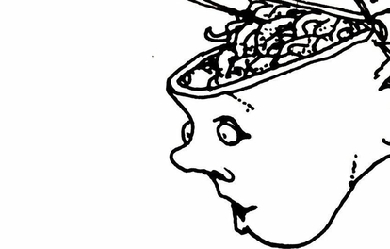
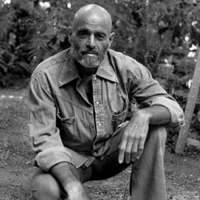
Sheldon Allan Shel Silverstein (September 25, 1930 – May 10, 1999), was an American poet, singer-songwriter, cartoonist, screenwriter, and author of children's books. He styled himself as Uncle Shelby in some works. Translated into more than 30 languages, his books have sold over 20 million copies.
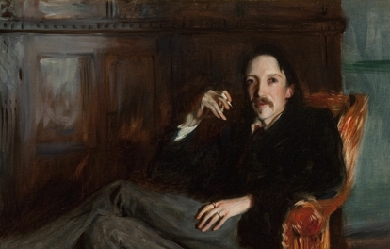
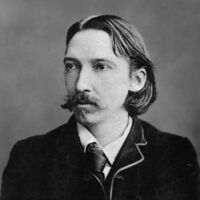
Robert Louis Balfour Stevenson (13 November 1850 – 3 December 1894) was a Scottish novelist, poet, essayist and travel writer. His best-known books include Treasure Island, Kidnapped, and Strange Case of Dr Jekyll and Mr Hyde. A literary celebrity during his lifetime, Stevenson now ranks among the 26 most translated authors in the world. He has been greatly admired by many authors, including Jorge Luis Borges, Ernest Hemingway, Rudyard Kipling, Marcel Schwob, Vladimir Nabokov, J. M. Barrie, and G. K. Chesterton, who said of him that he “seemed to pick the right word up on the point of his pen, like a man playing spillikins”.
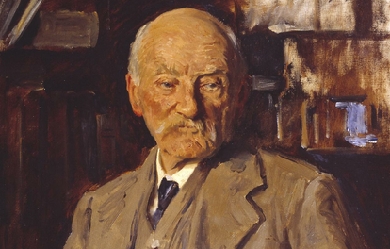
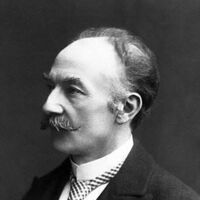
Thomas Hardy (2 June 1840 – 11 January 1928) was an English novelist and poet. While his works typically belong to the Naturalism movement, several poems display elements of the previous Romantic and Enlightenment periods of literature, such as his fascination with the supernatural. While he regarded himself primarily as a poet who composed novels mainly for financial gain, he became and continues to be widely regarded for his novels, such as Tess of the d'Urbervilles and Far from the Madding Crowd. Hardy's poetry, first published in his fifties, has come to be as well regarded as his novels and has had a significant influence over modern English poetry, especially after The Movement poets of the 1950s and 1960s cited Hardy as a major figure.
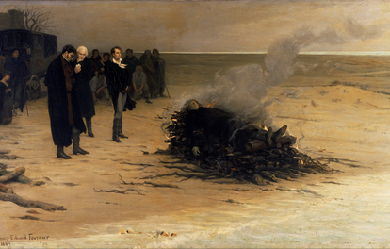
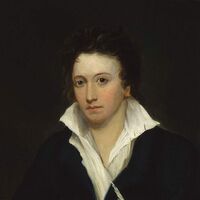
Percy Bysshe Shelley (4 August 1792 – 8 July 1822) was one of the major English Romantic poets and is critically regarded as among the finest lyric poets in the English language. Shelley was famous for his association with John Keats and Lord Byron. The novelist Mary Shelley (née Godwin) was his second wife. Shelley's unconventional life and uncompromising idealism, combined with his strong disapproving voice, made him a marginalized figure during his life, important in a fairly small circle of admirers, and opened him to criticism as well as praise afterward.
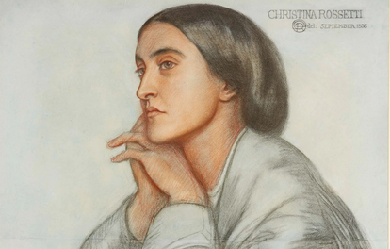

In 1830, Christina Rossetti was born in London, one of four children of Italian parents. Her father was the poet Gabriele Rossetti; her brother Dante Gabriel Rossetti also became a poet and a painter. Rossetti’s first poems were written in 1842 and printed in the private press of her grandfather. In 1850, under the pseudonym Ellen Alleyne, she contributed seven poems to the Pre-Raphaelite journal The Germ, which had been founded by her brother William Michael and his friends.


Wystan Hugh Auden (21 February 1907 – 29 September 1973), who published as W. H. Auden, was an Anglo-American poet, born in England, later an American citizen, regarded by many as one of the greatest writers of the 20th century. His work is noted for its stylistic and technical achievements, its engagement with moral and political issues, and its variety of tone, form and content. The central themes of his poetry are love, politics and citizenship, religion and morals, and the relationship between unique human beings and the anonymous, impersonal world of nature. Auden grew up in Birmingham in a professional middle class family and read English literature at Christ Church, Oxford. His early poems, written in the late 1920s and early 1930s, alternated between telegraphic modern styles and fluent traditional ones, were written in an intense and dramatic tone, and established his reputation as a left-wing political poet and prophet. He became uncomfortable in this role in the later 1930s, and abandoned it after he moved to the United States in 1939, where he became an American citizen in 1946. His poems in the 1940s explored religious and ethical themes in a less dramatic manner than his earlier works, but still combined traditional forms and styles with new forms devised by Auden himself. In the 1950s and 1960s many of his poems focused on the ways in which words revealed and concealed emotions, and he took a particular interest in writing opera librettos, a form ideally suited to direct expression of strong feelings.

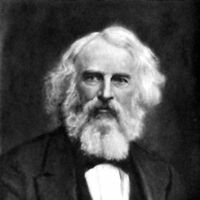
Henry Wadsworth Longfellow (February 27, 1807 – March 24, 1882) was an American poet and educator whose works include "Paul Revere's Ride", The Song of Hiawatha, and Evangeline. He was also the first American to translate Dante Alighieri's The Divine Comedy and was one of the five Fireside Poets. Longfellow was born in Portland, Maine, then part of Massachusetts, and studied at Bowdoin College. After spending time in Europe he became a professor at Bowdoin and, later, at Harvard College. His first major poetry collections were Voices of the Night (1839) and Ballads and Other Poems (1841). Longfellow retired from teaching in 1854 to focus on his writing, living the remainder of his life in Cambridge, Massachusetts, in a former headquarters of George Washington. His first wife, Mary Potter, died in 1835 after a miscarriage. His second wife, Frances Appleton, died in 1861 after sustaining burns from her dress catching fire. After her death, Longfellow had difficulty writing poetry for a time and focused on his translation. He died in 1882.

Frederic Ogden Nash (August 19, 1902 – May 19, 1971) was an American poet well known for his light verse. At the time of his death in 1971, The New York Times said his “droll verse with its unconventional rhymes made him the country’s best-known producer of humorous poetry”. Nash wrote over 500 pieces of comic verse. The best of his work was published in 14 volumes between 1931 and 1972.

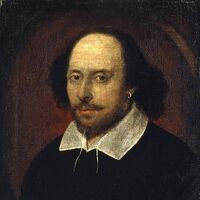
William Shakespeare (baptised 26 April 1564; died 23 April 1616) was an English poet and playwright, widely regarded as the greatest writer in the English language and the world's pre-eminent dramatist. He is often called England's national poet and the "Bard of Avon". His surviving works, including some collaborations, consist of about 38 plays, 154 sonnets, two long narrative poems, and several other poems. His plays have been translated into every major living language and are performed more often than those of any other playwright. Authorship Around 230 years after Shakespeare’s death, doubts began to be expressed about the authorship of the works attributed to him. Proposed alternative candidates include Francis Bacon, Christopher Marlowe, and Edward de Vere, 17th Earl of Oxford. Several “group theories” have also been proposed. All but a few Shakespeare scholars and literary historians consider it a fringe theory, with only a small minority of academics who believe that there is reason to question the traditional attribution, but interest in the subject, particularly the Oxfordian theory of Shakespeare authorship, continues into the 21st century.

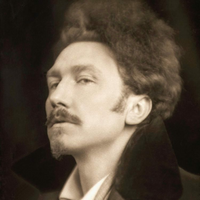
Ezra Weston Loomis Pound (30 October 1885 – 1 November 1972) was an American expatriate poet, critic and a major figure of the early modernist movement. His contribution to poetry began with his promotion of Imagism, a movement that derived its technique from classical Chinese and Japanese poetry, stressing clarity, precision and economy of language. His best-known works include Ripostes (1912), Hugh Selwyn Mauberley (1920), and his unfinished 120-section epic, The Cantos (1917–1969). Working in London in the early 20th century as foreign editor of several American literary magazines, Pound helped to discover and shape the work of contemporaries such as T. S. Eliot, James Joyce, Robert Frost, and Ernest Hemingway. He was responsible for the publication in 1915 of Eliot's “The Love Song of J. Alfred Prufrock,” and for the serialization from 1918 of Joyce's Ulysses. Hemingway wrote of him in 1925: “He defends [his friends] when they are attacked, he gets them into magazines and out of jail. ... He writes articles about them. He introduces them to wealthy women. He gets publishers to take their books. He sits up all night with them when they claim to be dying... he advances them hospital expenses and dissuades them from suicide.”

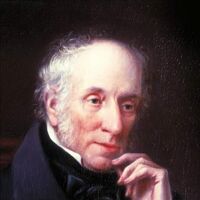
William Wordsworth (7 April 1770 – 23 April 1850) was a major English Romantic poet who, with Samuel Taylor Coleridge, helped to launch the Romantic Age in English literature with the 1798 joint publication Lyrical Ballads. Wordsworth's magnum opus is generally considered to be The Prelude, a semiautobiographical poem of his early years which he revised and expanded a number of times. It was posthumously titled and published, prior to which it was generally known as the poem "to Coleridge". Wordsworth was Britain's Poet Laureate from 1843 until his death in 1850. Early life The second of five children born to John Wordsworth and Ann Cookson, William Wordsworth was born on 7 April 1770 in Wordsworth House in Cockermouth, Cumberland—part of the scenic region in northwest England, the Lake District. His sister, the poet and diarist Dorothy Wordsworth, to whom he was close all his life, was born the following year, and the two were baptised together. They had three other siblings: Richard, the eldest, who became a lawyer; John, born after Dorothy, who went to sea and died in 1805 when the ship of which he was Master, the Earl of Abergavenny, was wrecked off the south coast of England; and Christopher, the youngest, who entered the Church and rose to be Master of Trinity College, Cambridge. Their father was a legal representative of James Lowther, 1st Earl of Lonsdale and, through his connections, lived in a large mansion in the small town. Wordsworth, as with his siblings, had little involvement with their father, and they would be distant from him until his death in 1783. Wordsworth's father, although rarely present, did teach him poetry, including that of Milton, Shakespeare and Spenser, in addition to allowing his son to rely on his own father's library. Along with spending time reading in Cockermouth, Wordsworth would also stay at his mother's parents house in Penrith, Cumberland. At Penrith, Wordsworth was exposed to the moors. Wordsworth could not get along with his grandparents and his uncle, and his hostile interactions with them distressed him to the point of contemplating suicide. After the death of their mother, in 1778, John Wordsworth sent William to Hawkshead Grammar School in Lancashire and Dorothy to live with relatives in Yorkshire; she and William would not meet again for another nine years. Although Hawkshead was Wordsworth's first serious experience with education, he had been taught to read by his mother and had attended a tiny school of low quality in Cockermouth. After the Cockermouth school, he was sent to a school in Penrith for the children of upper-class families and taught by Ann Birkett, a woman who insisted on instilling in her students traditions that included pursuing both scholarly and local activities, especially the festivals around Easter, May Day, and Shrove Tuesday. Wordsworth was taught both the Bible and the Spectator, but little else. It was at the school that Wordsworth was to meet the Hutchinsons, including Mary, who would be his future wife. Wordsworth made his debut as a writer in 1787 when he published a sonnet in The European Magazine. That same year he began attending St John's College, Cambridge, and received his B.A. degree in 1791. He returned to Hawkshead for his first two summer holidays, and often spent later holidays on walking tours, visiting places famous for the beauty of their landscape. In 1790, he took a walking tour of Europe, during which he toured the Alps extensively, and visited nearby areas of France, Switzerland, and Italy. Relationship with Annette Vallon In November 1791, Wordsworth visited Revolutionary France and became enthralled with the Republican movement. He fell in love with a French woman, Annette Vallon, who in 1792 gave birth to their child, Caroline. Because of lack of money and Britain's tensions with France, he returned alone to England the next year. The circumstances of his return and his subsequent behaviour raise doubts as to his declared wish to marry Annette, but he supported her and his daughter as best he could in later life. The Reign of Terror estranged him from the Republican movement, and war between France and Britain prevented him from seeing Annette and Caroline again for several years. There are strong suggestions that Wordsworth may have been depressed and emotionally unsettled in the mid-1790s. With the Peace of Amiens again allowing travel to France, in 1802 Wordsworth and his sister, Dorothy, visited Annette and Caroline in Calais. The purpose of the visit was to pave the way for his forthcoming marriage to Mary Hutchinson, and a mutually agreeable settlement was reached regarding Wordsworth's obligations. Afterwards he wrote the poem "It is a beauteous evening, calm and free," recalling his seaside walk with his daughter, whom he had not seen for ten years. At the conception of this poem, he had never seen his daughter before. The occurring lines reveal his deep love for both child and mother. First publication and Lyrical Ballads In his "Preface to Lyrical Ballads", which is called the "manifesto" of English Romantic criticism, Wordsworth calls his poems "experimental." The year 1793 saw Wordsworth's first published poetry with the collections An Evening Walk and Descriptive Sketches. He received a legacy of £900 from Raisley Calvert in 1795 so that he could pursue writing poetry. That year, he met Samuel Taylor Coleridge in Somerset. The two poets quickly developed a close friendship. In 1797, Wordsworth and his sister Dorothy moved to Alfoxton House, Somerset, just a few miles away from Coleridge's home in Nether Stowey. Together, Wordsworth and Coleridge (with insights from Dorothy) produced Lyrical Ballads (1798), an important work in the English Romantic movement. The volume gave neither Wordsworth's nor Coleridge's name as author. One of Wordsworth's most famous poems, "Tintern Abbey", was published in the work, along with Coleridge's "The Rime of the Ancient Mariner". The second edition, published in 1800, had only Wordsworth listed as the author, and included a preface to the poems, which was augmented significantly in the 1802 edition. This Preface to Lyrical Ballads is considered a central work of Romantic literary theory. In it, Wordsworth discusses what he sees as the elements of a new type of poetry, one based on the "real language of men" and which avoids the poetic diction of much 18th-century poetry. Here, Wordsworth gives his famous definition of poetry as "the spontaneous overflow of powerful emotions recollected in tranquility: it takes its origin from emotion recollected in tranquility." A fourth and final edition of Lyrical Ballads was published in 1805. The Borderers From 1795 to 1797, he wrote his only play, The Borderers, a verse tragedy set during the reign of King Henry III of England when Englishmen of the north country were in conflict with Scottish rovers. Wordsworth attempted to get the play staged in November 1797, but it was rejected by Thomas Harris, theatre manager of Covent Garden, who proclaimed it "impossible that the play should succeed in the representation". The rebuff was not received lightly by Wordsworth, and the play was not published until 1842, after substantial revision. Germany and move to the Lake District Wordsworth, Dorothy and Coleridge travelled to Germany in the autumn of 1798. While Coleridge was intellectually stimulated by the trip, its main effect on Wordsworth was to produce homesickness. During the harsh winter of 1798–99, Wordsworth lived with Dorothy in Goslar, and, despite extreme stress and loneliness, he began work on an autobiographical piece later titled The Prelude. He wrote a number of famous poems, including "The Lucy poems". He and his sister moved back to England, now to Dove Cottage in Grasmere in the Lake District, and this time with fellow poet Robert Southey nearby. Wordsworth, Coleridge and Southey came to be known as the "Lake Poets". Through this period, many of his poems revolve around themes of death, endurance, separation and grief. Marriage and children In 1802, after Wordsworth's return from his trip to France with Dorothy to visit Annette and Caroline, Lowther's heir, William Lowther, 1st Earl of Lonsdale, paid the ₤4, debt owed to Wordsworth's father incurred through Lowther's failure to pay his aide. Later that year, on October 4, Wordsworth married a childhood friend, Mary Hutchinson. Dorothy continued to live with the couple and grew close to Mary. The following year, Mary gave birth to the first of five children, three of whom predeceased William and Mary: * John Wordsworth (18 June 1803 – 1875). * Dora Wordsworth (16 August 1804 – 9 July 1847). * Thomas Wordsworth (15 June 1806 – 1 December 1812). * Catherine Wordsworth (6 September 1808 – 4 June 1812). * William "Willy" Wordsworth (12 May 1810 – 1883). Autobiographical work and Poems in Two Volumes Wordsworth had for years been making plans to write a long philosophical poem in three parts, which he intended to call The Recluse. He had in 1798–99 started an autobiographical poem, which he never named but called the "poem to Coleridge", which would serve as an appendix to The Recluse. In 1804, he began expanding this autobiographical work, having decided to make it a prologue rather than an appendix to the larger work he planned. By 1805, he had completed it, but refused to publish such a personal work until he had completed the whole of The Recluse. The death of his brother, John, in 1805 affected him strongly. The source of Wordsworth's philosophical allegiances as articulated in The Prelude and in such shorter works as "Lines composed a few miles above Tintern Abbey" has been the source of much critical debate. While it had long been supposed that Wordsworth relied chiefly on Coleridge for philosophical guidance, more recent scholarship has suggested that Wordsworth's ideas may have been formed years before he and Coleridge became friends in the mid 1790s. While in Revolutionary Paris in 1792, the 22-year-old Wordsworth made the acquaintance of the mysterious traveller John "Walking" Stewart (1747–1822), who was nearing the end of a thirty-years' peregrination from Madras, India, through Persia and Arabia, across Africa and all of Europe, and up through the fledgling United States. By the time of their association, Stewart had published an ambitious work of original materialist philosophy entitled The Apocalypse of Nature (London, 1791), to which many of Wordsworth's philosophical sentiments are likely indebted. In 1807, his Poems in Two Volumes were published, including "Ode: Intimations of Immortality from Recollections of Early Childhood". Up to this point Wordsworth was known publicly only for Lyrical Ballads, and he hoped this collection would cement his reputation. Its reception was lukewarm, however. For a time (starting in 1810), Wordsworth and Coleridge were estranged over the latter's opium addiction. Two of his children, Thomas and Catherine, died in 1812. The following year, he received an appointment as Distributor of Stamps for Westmorland, and the £400 per year income from the post made him financially secure. His family, including Dorothy, moved to Rydal Mount, Ambleside (between Grasmere and Rydal Water) in 1813, where he spent the rest of his life. The Prospectus In 1814 he published The Excursion as the second part of the three-part The Recluse. He had not completed the first and third parts, and never would. He did, however, write a poetic Prospectus to "The Recluse" in which he lays out the structure and intent of the poem. The Prospectus contains some of Wordsworth's most famous lines on the relation between the human mind and nature: My voice proclaims How exquisitely the individual Mind (And the progressive powers perhaps no less Of the whole species) to the external World Is fitted:--and how exquisitely, too, Theme this but little heard of among Men, The external World is fitted to the Mind. Some modern critics[who?] recognise a decline in his works beginning around the mid-1810s. But this decline was perhaps more a change in his lifestyle and beliefs, since most of the issues that characterise his early poetry (loss, death, endurance, separation and abandonment) were resolved in his writings. But, by 1820, he enjoyed the success accompanying a reversal in the contemporary critical opinion of his earlier works. Following the death of his friend the painter William Green in 1823, Wordsworth mended relations with Coleridge. The two were fully reconciled by 1828, when they toured the Rhineland together. Dorothy suffered from a severe illness in 1829 that rendered her an invalid for the remainder of her life. In 1835, Wordsworth gave Annette and Caroline the money they needed for support. The Poet Laureate and other honours Wordsworth received an honorary Doctor of Civil Law degree in 1838 from Durham University, and the same honour from Oxford University the next year. In 1842 the government awarded him a civil list pension amounting to £300 a year. With the death in 1843 of Robert Southey, Wordsworth became the Poet Laureate. He initially refused the honour, saying he was too old, but accepted when Prime Minister Robert Peel assured him "you shall have nothing required of you" (he became the only laureate to write no official poetry). When his daughter, Dora, died in 1847, his production of poetry came to a standstill. Death William Wordsworth died by re-aggravating a case of pleurisy on 23 April 1850, and was buried at St. Oswald's church in Grasmere. His widow Mary published his lengthy autobiographical "poem to Coleridge" as The Prelude several months after his death. Though this failed to arouse great interest in 1850, it has since come to be recognised as his masterpiece. Major works Lyrical Ballads, with a Few Other Poems (1798) * "Simon Lee" * "We are Seven" * "Lines Written in Early Spring" * "Expostulation and Reply" * "The Tables Turned" * "The Thorn" * "Lines Composed A Few Miles above Tintern Abbey" Lyrical Ballads, with Other Poems (1800) * Preface to the Lyrical Ballads * "Strange fits of passion have I known"[14] * "She Dwelt among the Untrodden Ways"[14] * "Three years she grew"[14] * "A Slumber Did my Spirit Seal"[14] * "I travelled among unknown men"[14] * "Lucy Gray" * "The Two April Mornings" * "Nutting" * "The Ruined Cottage" * "Michael" * "The Kitten At Play" Poems, in Two Volumes (1807) * "Resolution and Independence" * "I Wandered Lonely as a Cloud" Also known as "Daffodils" * "My Heart Leaps Up" * "Ode: Intimations of Immortality" * "Ode to Duty" * "The Solitary Reaper" * "Elegiac Stanzas" * "Composed upon Westminster Bridge, September 3, 1802" * "London, 1802" * "The World Is Too Much with Us" * Guide to the Lakes (1810) * The Excursion (1814) * Laodamia (1815, 1845) * The Prelude (1850) References Wikipedia – http://en.wikipedia.org/wiki/William_Wordsworth

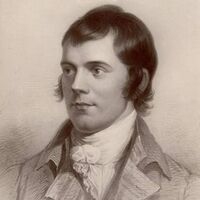
Robert Burns (25 January 1759 – 21 July 1796) (also known as Rabbie Burns, Scotland's favourite son, the Ploughman Poet, Robden of Solway Firth, the Bard of Ayrshire and in Scotland as simply The Bard) was a Scottish poet and a lyricist. He is widely regarded as the national poet of Scotland, and is celebrated worldwide. He is the best known of the poets who have written in the Scots language, although much of his writing is also in English and a “light” Scots dialect, accessible to an audience beyond Scotland. He also wrote in standard English, and in these his political or civil commentary is often at its most blunt.
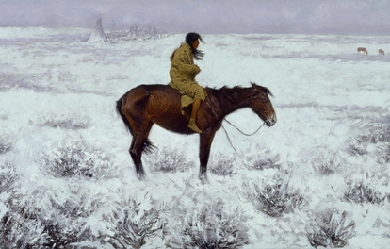
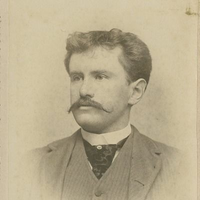
William Sydney Porter (September 11, 1862– June 5, 1910), known by his pen name O. Henry, was an American short story writer. His stories are known for their surprise endings. Biography Early life William Sidney Porter was born on September 11, 1862, in Greensboro, North Carolina. He changed the spelling of his middle name to Sydney in 1898. His parents were Dr. Algernon Sidney Porter (1825–88), a physician, and Mary Jane Virginia Swaim Porter (1833–65). William’s parents had married on April 20, 1858. When William was three, his mother died from tuberculosis, and he and his father moved into the home of his paternal grandmother. As a child, Porter was always reading, everything from classics to dime novels; his favorite works were Lane’s translation of One Thousand and One Nights and Burton’s Anatomy of Melancholy. Porter graduated from his aunt Evelina Maria Porter’s elementary school in 1876. He then enrolled at the Lindsey Street High School. His aunt continued to tutor him until he was fifteen. In 1879, he started working in his uncle’s drugstore in Greensboro, and on August 30, 1881, at the age of nineteen, Porter was licensed as a pharmacist. At the drugstore, he also showed off his natural artistic talents by sketching the townsfolk. Move to Texas Porter traveled with Dr. James K. Hall to Texas in March 1882, hoping that a change of air would help alleviate a persistent cough he had developed. He took up residence on the sheep ranch of Richard Hall, James’ son, in La Salle County and helped out as a shepherd, ranch hand, cook, and baby-sitter. While on the ranch, he learned bits of Spanish and German from the mix of immigrant ranch hands. He also spent time reading classic literature. Porter’s health did improve. He traveled with Richard to Austin in 1884, where he decided to remain and was welcomed into the home of Richard’s friends, Joseph Harrell and his wife. Porter resided with the Harrells for three years. He went to work briefly for the Morley Brothers Drug Company as a pharmacist. Porter then moved on to work for the Harrell Cigar Store located in the Driskill Hotel. He also began writing as a sideline and wrote many of his early stories in the Harrell house. As a young bachelor, Porter led an active social life in Austin. He was known for his wit, story-telling and musical talents. He played both the guitar and mandolin. He sang in the choir at St. David’s Episcopal Church and became a member of the “Hill City Quartette”, a group of young men who sang at gatherings and serenaded young women of the town. Porter met and began courting Athol Estes, then seventeen years old and from a wealthy family. Historians believe Porter met Athol at the laying of the cornerstone of the Texas State Capitol on March 2, 1885. Her mother objected to the match because Athol was ill, suffering from tuberculosis. On July 1, 1887, Porter eloped with Athol and were married in the parlor of the home of Reverend R. K. Smoot, pastor of the Central Presbyterian Church, where the Estes family attended church. The couple continued to participate in musical and theater groups, and Athol encouraged her husband to pursue his writing. Athol gave birth to a son in 1888, who died hours after birth, and then a daughter, Margaret Worth Porter, in September 1889. Porter’s friend Richard Hall became Texas Land Commissioner and offered Porter a job. Porter started as a draftsman at the Texas General Land Office (GLO) on January 12, 1887 at a salary of $100 a month, drawing maps from surveys and fieldnotes. The salary was enough to support his family, but he continued his contributions to magazines and newspapers. In the GLO building, he began developing characters and plots for such stories as “Georgia’s Ruling” (1900), and “Buried Treasure” (1908). The castle-like building he worked in was even woven into some of his tales such as "Bexar Scrip No. 2692" (1894). His job at the GLO was a political appointment by Hall. Hall ran for governor in the election of 1890 but lost. Porter resigned on January 21, 1891, the day after the new governor, Jim Hogg, was sworn in. The same year, Porter began working at the First National Bank of Austin as a teller and bookkeeper at the same salary he had made at the GLO. The bank was operated informally, and Porter was apparently careless in keeping his books and may have embezzled funds. In 1894, he was accused by the bank of embezzlement and lost his job but was not indicted at the time. He then worked full-time on his humorous weekly called The Rolling Stone, which he started while working at the bank. The Rolling Stone featured satire on life, people and politics and included Porter’s short stories and sketches. Although eventually reaching a top circulation of 1500, The Rolling Stone failed in April 1895, since the paper never provided an adequate income. However, his writing and drawings had caught the attention of the editor at the Houston Post. Porter and his family moved to Houston in 1895, where he started writing for the Post. His salary was only $25 a month, but it rose steadily as his popularity increased. Porter gathered ideas for his column by loitering in hotel lobbies and observing and talking to people there. This was a technique he used throughout his writing career. While he was in Houston, federal auditors audited the First National Bank of Austin and found the embezzlement shortages that led to his firing. A federal indictment followed, and he was arrested on charges of embezzlement. Flight and return Porter’s father-in-law posted bail to keep him out of jail. He was due to stand trial on July 7, 1896, but the day before, as he was changing trains to get to the courthouse, an impulse hit him. He fled, first to New Orleans and later to Honduras, with which the United States had no extradition treaty at that time. William lived in Honduras for only six months, until January 1897. There he became friends with Al Jennings, a notorious train robber, who later wrote a book about their friendship. He holed up in a Trujillo hotel, where he wrote Cabbages and Kings, in which he coined the term “banana republic” to qualify the country, a phrase subsequently used widely to describe a small, unstable tropical nation in Latin America with a narrowly focused, agrarian economy. Porter had sent Athol and Margaret back to Austin to live with Athol’s parents. Unfortunately, Athol became too ill to meet Porter in Honduras as he had planned. When he learned that his wife was dying, Porter returned to Austin in February 1897 and surrendered to the court, pending trial. Athol Estes Porter died from tuberculosis (then known as consumption) on July 25, 1897. Porter had little to say in his own defense at his trial and was found guilty on February 17, 1898 of embezzling $854.08. He was sentenced to five years in prison and imprisoned on March 25, 1898, at the Ohio Penitentiary in Columbus, Ohio. Porter was a licensed pharmacist and was able to work in the prison hospital as the night druggist. He was given his own room in the hospital wing, and there is no record that he actually spent time in the cell block of the prison. He had fourteen stories published under various pseudonyms while he was in prison but was becoming best known as “O. Henry”, a pseudonym that first appeared over the story “Whistling Dick’s Christmas Stocking” in the December 1899 issue of McClure’s Magazine. A friend of his in New Orleans would forward his stories to publishers so that they had no idea that the writer was imprisoned. Porter was released on July 24, 1901, for good behavior after serving three years. He reunited with his daughter Margaret, now age 11, in Pittsburgh, Pennsylvania, where Athol’s parents had moved after Porter’s conviction. Margaret was never told that her father had been in prison—just that he had been away on business. Later life and death Porter’s most prolific writing period started in 1902, when he moved to New York City to be near his publishers. While there, he wrote 381 short stories. He wrote a story a week for over a year for the New York World Sunday Magazine. His wit, characterization, and plot twists were adored by his readers but often panned by critics. Porter married again in 1907 to childhood sweetheart Sarah (Sallie) Lindsey Coleman, whom he met again after revisiting his native state of North Carolina. Sarah Lindsey Coleman was herself a writer and wrote a romanticized and fictionalized version of their correspondence and courtship in her novella Wind of Destiny. Porter was a heavy drinker, and by 1908, his markedly deteriorating health affected his writing. In 1909, Sarah left him, and he died on June 5, 1910, of cirrhosis of the liver, complications of diabetes, and an enlarged heart. After funeral services in New York City, he was buried in the Riverside Cemetery in Asheville, North Carolina. His daughter, Margaret Worth Porter, had a short writing career from 1913 to 1916. She married cartoonist Oscar Cesare of New York in 1916; they were divorced four years later. She died of tuberculosis in 1927 and is buried next to her father. Stories O. Henry’s stories frequently have surprise endings. In his day he was called the American answer to Guy de Maupassant. While both authors wrote plot twist endings, O. Henry’s stories were considerably more playful. His stories are also known for witty narration. Most of O. Henry’s stories are set in his own time, the early 20th century. Many take place in New York City and deal for the most part with ordinary people: policemen, waitresses, etc. O. Henry’s work is wide-ranging, and his characters can be found roaming the cattle-lands of Texas, exploring the art of the con-man, or investigating the tensions of class and wealth in turn-of-the-century New York. O. Henry had an inimitable hand for isolating some element of society and describing it with an incredible economy and grace of language. Some of his best and least-known work is contained in Cabbages and Kings, a series of stories each of which explores some individual aspect of life in a paralytically sleepy Central American town, while advancing some aspect of the larger plot and relating back one to another. Cabbages and Kings was his first collection of stories, followed by The Four Million. The second collection opens with a reference to Ward McAllister’s “assertion that there were only 'Four Hundred’ people in New York City who were really worth noticing. But a wiser man has arisen—the census taker—and his larger estimate of human interest has been preferred in marking out the field of these little stories of the ‘Four Million.’” To O. Henry, everyone in New York counted. He had an obvious affection for the city, which he called “Bagdad-on-the-Subway”, and many of his stories are set there—while others are set in small towns or in other cities. His final work was “Dream”, a short story intended for the magazine The Cosmopolitan but left incomplete at the time of his death. Among his most famous stories are: “The Gift of the Magi” about a young couple, Jim and Della, who are short of money but desperately want to buy each other Christmas gifts. Unbeknownst to Jim, Della sells her most valuable possession, her beautiful hair, in order to buy a platinum fob chain for Jim’s watch; while unbeknownst to Della, Jim sells his own most valuable possession, his watch, to buy jeweled combs for Della’s hair. The essential premise of this story has been copied, re-worked, parodied, and otherwise re-told countless times in the century since it was written. “The Ransom of Red Chief”, in which two men kidnap a boy of ten. The boy turns out to be so bratty and obnoxious that the desperate men ultimately pay the boy’s father $250 to take him back. “The Cop and the Anthem” about a New York City hobo named Soapy, who sets out to get arrested so that he can be a guest of the city jail instead of sleeping out in the cold winter. Despite efforts at petty theft, vandalism, disorderly conduct, and “mashing” with a young prostitute, Soapy fails to draw the attention of the police. Disconsolate, he pauses in front of a church, where an organ anthem inspires him to clean up his life—and is ironically charged for loitering and sentenced to three months in prison. “A Retrieved Reformation”, which tells the tale of safecracker Jimmy Valentine, recently freed from prison. He goes to a town bank to case it before he robs it. As he walks to the door, he catches the eye of the banker’s beautiful daughter. They immediately fall in love and Valentine decides to give up his criminal career. He moves into the town, taking up the identity of Ralph Spencer, a shoemaker. Just as he is about to leave to deliver his specialized tools to an old associate, a lawman who recognizes him arrives at the bank. Jimmy and his fiancée and her family are at the bank, inspecting a new safe when a child accidentally gets locked inside the airtight vault. Knowing it will seal his fate, Valentine opens the safe to rescue the child. However, much to Valentine’s surprise, the lawman denies recognizing him and lets him go. “The Duplicity of Hargraves”. A short story about a nearly destitute father and daughter’s trip to Washington, D.C. “The Caballero’s Way”, in which Porter’s most famous character, the Cisco Kid, is introduced. It was first published in 1907 in the July issue of Everybody’s Magazine and collected in the book Heart of the West that same year. In later film and TV depictions, the Kid would be portrayed as a dashing adventurer, perhaps skirting the edges of the law, but primarily on the side of the angels. In the original short story, the only story by Porter to feature the character, the Kid is a murderous, ruthless border desperado, whose trail is dogged by a heroic Texas Ranger. The twist ending is, unusually for Porter, tragic. Pen name Porter used a number of pen names (including “O. Henry” or “Olivier Henry”) in the early part of his writing career; other names included S.H. Peters, James L. Bliss, T.B. Dowd, and Howard Clark. Nevertheless, the name “O. Henry” seemed to garner the most attention from editors and the public, and was used exclusively by Porter for his writing by about 1902. He gave various explanations for the origin of his pen name. In 1909 he gave an interview to The New York Times, in which he gave an account of it: It was during these New Orleans days that I adopted my pen name of O. Henry. I said to a friend: “I’m going to send out some stuff. I don’t know if it amounts to much, so I want to get a literary alias. Help me pick out a good one.” He suggested that we get a newspaper and pick a name from the first list of notables that we found in it. In the society columns we found the account of a fashionable ball. “Here we have our notables,” said he. We looked down the list and my eye lighted on the name Henry, “That’ll do for a last name,” said I. “Now for a first name. I want something short. None of your three-syllable names for me.” “Why don’t you use a plain initial letter, then?” asked my friend. “Good,” said I, “O is about the easiest letter written, and O it is.” A newspaper once wrote and asked me what the O stands for. I replied, “O stands for Olivier, the French for Oliver.” And several of my stories accordingly appeared in that paper under the name Olivier Henry. William Trevor writes in the introduction to The World of O. Henry: Roads of Destiny and Other Stories (Hodder & Stoughton, 1973) that “there was a prison guard named Orrin Henry” in the Ohio State Penitentiary “whom William Sydney Porter... immortalised as O. Henry”. According to J. F. Clarke, it is from the name of the French pharmacist Etienne Ossian Henry, whose name is in the U. S. Dispensary which Porter used working in the prison pharmacy. Writer and scholar Guy Davenport offers his own hypothesis: “The pseudonym that he began to write under in prison is constructed from the first two letters of Ohio and the second and last two of penitentiary.” Legacy The O. Henry Award is a prestigious annual prize named after Porter and given to outstanding short stories. A film was made in 1952 featuring five stories, called O. Henry’s Full House. The episode garnering the most critical acclaim was “The Cop and the Anthem” starring Charles Laughton and Marilyn Monroe. The other stories are “The Clarion Call”, “The Last Leaf”, “The Ransom of Red Chief” (starring Fred Allen and Oscar Levant), and “The Gift of the Magi”. The O. Henry House and O. Henry Hall, both in Austin, Texas, are named for him. O. Henry Hall, now owned by the Texas State University System, previously served as the federal courthouse in which O. Henry was convicted of embezzlement. Porter has elementary schools named for him in Greensboro, North Carolina (William Sydney Porter Elementary) and Garland, Texas (O. Henry Elementary), as well as a middle school in Austin, Texas (O. Henry Middle School). The O. Henry Hotel in Greensboro is also named for Porter, as is US 29 which is O. Henry Boulevard. In 1962, the Soviet Postal Service issued a stamp commemorating O. Henry’s 100th birthday. On September 11, 2012, the U.S. Postal Service issued a stamp commemorating the 150th anniversary of O. Henry’s birth. On November 23, 2011, Barack Obama quoted O. Henry while granting pardons to two turkeys named “Liberty” and “Peace”. In response, political science professor P. S. Ruckman, Jr., and Texas attorney Scott Henson filed a formal application for a posthumous pardon in September 2012, the same month that the U.S. Postal Service issued its O. Henry stamp. Previous attempts were made to obtain such a pardon for Porter in the administrations of Woodrow Wilson, Dwight Eisenhower, and Ronald Reagan, but no one had ever bothered to file a formal application. Ruckman and Henson argued that Porter deserved a pardon because (1) he was a law-abiding citizen prior to his conviction; (2) his offense was minor; (3) he had an exemplary prison record; (4) his post-prison life clearly indicated rehabilitation; (5) he would have been an excellent candidate for clemency in his time, had he but applied for pardon; (6) by today’s standards, he remains an excellent candidate for clemency; and (7) his pardon would be a well-deserved symbolic gesture and more. O. Henry’s love of language inspired the O. Henry Pun-Off, an annual spoken word competition began in 1978 that takes place at the O. Henry House. Bibliography * Cabbages and Kings (1904) * The Four Million (1906), short stories * The Trimmed Lamp (1907), short stories: “The Trimmed Lamp”, “A Madison Square Arabian Night”, “The Rubaiyat of a Scotch Highball”, “The Pendulum”, “Two Thanksgiving Day Gentlemen”, “The Assessor of Success”, “The Buyer from Cactus City”, “The Badge of Policeman O’Roon”, “Brickdust Row”, “The Making of a New Yorker”, “Vanity and Some Sables”, “The Social Triangle”, “The Purple Dress”, "The Foreign Policy of Company 99", “The Lost Blend”, “A Harlem Tragedy”, “'The Guilty Party’”, “According to Their Lights”, “A Midsummer Knight’s Dream”, “The Last Leaf”, “The Count and the Wedding Guest”, “The Country of Elusion”, “The Ferry of Unfulfilment”, “The Tale of a Tainted Tenner”, “Elsie in New York” * Heart of the West (1907), short stories: “Hearts and Crosses”, “The Ransom of Mack”, “Telemachus, Friend”, “The Handbook of Hymen”, “The Pimienta Pancakes”, “Seats of the Haughty”, “Hygeia at the Solito”, “An Afternoon Miracle”, “The Higher Abdication”, "Cupid à la Carte", “The Caballero’s Way”, “The Sphinx Apple”, “The Missing Chord”, “A Call Loan”, “The Princess and the Puma”, “The Indian Summer of Dry Valley Johnson”, “Christmas by Injunction”, “A Chaparral Prince”, “The Reformation of Calliope” * The Voice of the City (1908), short stories: “The Voice of the City”, “The Complete Life of John Hopkins”, “A Lickpenny Lover”, “Dougherty’s Eye-opener”, “'Little Speck in Garnered Fruit’”, “The Harbinger”, “While the Auto Waits”, “A Comedy in Rubber”, “One Thousand Dollars”, “The Defeat of the City”, “The Shocks of Doom”, “The Plutonian Fire”, “Nemesis and the Candy Man”, “Squaring the Circle”, “Roses, Ruses and Romance”, “The City of Dreadful Night”, “The Easter of the Soul”, “The Fool-killer”, “Transients in Arcadia”, “The Rathskeller and the Rose”, “The Clarion Call”, “Extradited from Bohemia”, “A Philistine in Bohemia”, “From Each According to His Ability”, “The Memento” * The Gentle Grafter (1908), short stories: “The Octopus Marooned”, “Jeff Peters as a Personal Magnet”, “Modern Rural Sports”, “The Chair of Philanthromathematics”, “The Hand That Riles the World”, “The Exact Science of Matrimony”, “A Midsummer Masquerade”, “Shearing the Wolf”, “Innocents of Broadway”, “Conscience in Art”, “The Man Higher Up”, “Tempered Wind”, “Hostages to Momus”, “The Ethics of Pig” * Roads of Destiny (1909), short stories: “Roads of Destiny”, “The Guardian of the Accolade”, “The Discounters of Money”, “The Enchanted Profile”, “Next to Reading Matter”, “Art and the Bronco”, "Phœbe", “A Double-dyed Deceiver”, “The Passing of Black Eagle”, “A Retrieved Reformation”, “Cherchez la Femme”, “Friends in San Rosario”, “The Fourth in Salvador”, “The Emancipation of Billy”, “The Enchanted Kiss”, “A Departmental Case”, “The Renaissance at Charleroi”, “On Behalf of the Management”, “Whistling Dick’s Christmas Stocking”, “The Halberdier of the Little Rheinschloss”, “Two Renegades”, “The Lonesome Road” * Options (1909), short stories: “'The Rose of Dixie’”, “The Third Ingredient”, “The Hiding of Black Bill”, “Schools and Schools”, “Thimble, Thimble”, “Supply and Demand”, “Buried Treasure”, “To Him Who Waits”, “He Also Serves”, “The Moment of Victory”, “The Head-hunter”, “No Story”, “The Higher Pragmatism”, “Best-seller”, “Rus in Urbe”, “A Poor Rule” * Strictly Business (1910), short stories: “Strictly Business”, “The Gold That Glittered”, “Babes in the Jungle”, “The Day Resurgent”, “The Fifth Wheel”, “The Poet and the Peasant”, “The Robe of Peace”, “The Girl and the Graft”, “The Call of the Tame”, “The Unknown Quantity”, “The Thing’s the Play”, “A Ramble in Aphasia”, “A Municipal Report”, “Psyche and the Pskyscraper”, “A Bird of Bagdad”, “Compliments of the Season”, “A Night in New Arabia”, “The Girl and the Habit”, “Proof of the Pudding”, “Past One at Rooney’s”, “The Venturers”, “The Duel”, “'What You Want’” * Whirligigs (1910), short stories: “The World and the Door”, “The Theory and the Hound”, “The Hypotheses of Failure”, “Calloway’s Code”, “A Matter of Mean Elevation”, “Girl”, “Sociology in Serge and Straw”, “The Ransom of Red Chief”, “The Marry Month of May”, “A Technical Error”, “Suite Homes and Their Romance”, “The Whirligig of Life”, “A Sacrifice Hit”, “The Roads We Take”, “A Blackjack Bargainer, ”The Song and the Sergeant", “One Dollar’s Worth”, “A Newspaper Story”, “Tommy’s Burglar”, “A Chaparral Christmas Gift”, “A Little Local Colour”, “Georgia’s Ruling”, “Blind Man’s Holiday”, “Madame Bo-Peep of the Ranches” * Sixes and Sevens (1911), short stories: “The Last of the Troubadours”, “The Sleuths”, “Witches’ Loaves”, “The Pride of the Cities”, “Holding Up a Train”, “Ulysses and the Dogman”, “The Champion of the Weather”, “Makes the Whole World Kin”, “At Arms with Morpheus”, “A Ghost of a Chance”, “Jimmy Hayes and Muriel”, “The Door of Unrest”, “The Duplicity of Hargraves”, “Let Me Feel Your Pulse”, “October and June”, “The Church with an Overshot-Wheel”, “New York by Camp Fire Light”, “The Adventures of Shamrock Jolnes”, “The Lady Higher Up”, “The Greater Coney”, “Law and Order”, “Transformation of Martin Burney”, “The Caliph and the Cad”, “The Diamond of Kali”, “The Day We Celebrate” * Rolling Stones (1912), short stories: “The Dream”, “A Ruler of Men”, “The Atavism of John Tom Little Bear”, “Helping the Other Fellow”, “The Marionettes”, “The Marquis and Miss Sally”, “A Fog in Santone”, “The Friendly Call”, “A Dinner at———”, “Sound and Fury”, “Tictocq”, “Tracked to Doom”, “A Snapshot at the President”, “An Unfinished Christmas Story”, “The Unprofitable Servant”, “Aristocracy Versus Hash”, “The Prisoner of Zembla”, “A Strange Story”, “Fickle Fortune, or How Gladys Hustled”, “An Apology”, “Lord Oakhurst’s Curse”, "Bexar Scrip No. 2692” * Waifs and Strays (1917), short stories References Wikipedia—https://en.wikipedia.org/wiki/O._Henry

